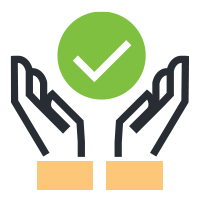Substance Abuse Prevention and Control
Types of Treatment
SAPC Treatment Options
There are several treatment options available. Depending on a clinician's assessment, a person can get started in any the following:

Early Intervention Services
Services available for youth (ages 12-17) and young adults (ages 18-20) who have been screened and determined to be at risk of developing a substance use disorder (SUD) but who do not meet the criteria for a SUD. Early intervention services are provided in an outpatient setting and are focused mainly on patient education and treatment as needed.
Services available for youth (ages 12-17) and young adults (ages 18-20) who have been screened and determined to be at risk of developing a substance use disorder (SUD) but who do not meet the criteria for a SUD. Early intervention services are provided in an outpatient setting and are focused mainly on patient education and treatment as needed.

Outpatient
Does not require 24-hour care. Treatment is offered during the day, before or after work or school, in the evening, and/or on weekends.
Does not require 24-hour care. Treatment is offered during the day, before or after work or school, in the evening, and/or on weekends.

Intensive Outpatient
Treatment that does not require overnight stays. Assessment, counseling, case management and other services are offered 1 or more days a week during the day, before or after work or school and in the evening, and weekends.
Treatment that does not require overnight stays. Assessment, counseling, case management and other services are offered 1 or more days a week during the day, before or after work or school and in the evening, and weekends.

Residential Treatment
Treatment is offered in a short-term living environment and provides 24-hour care and support.
Treatment is offered in a short-term living environment and provides 24-hour care and support.

Opioid Treatment Program
Outpatient services that specialize in prescribing medications for addiction treatment (MAT) to individuals with opioid and alcohol use disorders coupled with other services such as individual counseling. MAT includes methadone, buprenorphine, naloxone (for opioid overdose prevention), and disulfiram. Services are offered daily.
Outpatient services that specialize in prescribing medications for addiction treatment (MAT) to individuals with opioid and alcohol use disorders coupled with other services such as individual counseling. MAT includes methadone, buprenorphine, naloxone (for opioid overdose prevention), and disulfiram. Services are offered daily.

Medications for Addiction Treatment (MAT)
In the same way that medication can treat other chronic conditions, medication can also treat some substance use disorders. Medications for Addiction Treatment, or MAT, is the use of medication to reduce the harm caused by drug or alcohol use. Combined with behavioral health interventions, MAT supports people in achieving and staying in recovery.
When prescribed and monitored by a doctor, these medications can reduce cravings and minimize withdrawal symptoms—leading people to stay in recovery for years or even decades. Any treatment provider offering any treatment option can either provide or refer to MAT services.
To learn more about MAT click here
In the same way that medication can treat other chronic conditions, medication can also treat some substance use disorders. Medications for Addiction Treatment, or MAT, is the use of medication to reduce the harm caused by drug or alcohol use. Combined with behavioral health interventions, MAT supports people in achieving and staying in recovery.
When prescribed and monitored by a doctor, these medications can reduce cravings and minimize withdrawal symptoms—leading people to stay in recovery for years or even decades. Any treatment provider offering any treatment option can either provide or refer to MAT services.
To learn more about MAT click here

Withdrawal Management (Detox)
Refers to the medical and psychological care of patients who are experiencing withdrawal symptoms as a result of stopping or reducing use of a drug they are dependent on. Services are offered for a short period and may be provided in community setting or in settings with 24-hour care depending on the severity.
Refers to the medical and psychological care of patients who are experiencing withdrawal symptoms as a result of stopping or reducing use of a drug they are dependent on. Services are offered for a short period and may be provided in community setting or in settings with 24-hour care depending on the severity.

Recovery Services
Recovery Services are recovery-oriented services designed to support individuals who have completed treatment stay engaged in the recovery process and reduce the likelihood of relapse. Services promote the use of effective self-management and coping strategies, as well as internal and community resources.
Recovery Services are recovery-oriented services designed to support individuals who have completed treatment stay engaged in the recovery process and reduce the likelihood of relapse. Services promote the use of effective self-management and coping strategies, as well as internal and community resources.
- Outpatient counseling
- Coaching and monitoring of an individual's recovery journey
- Peer support
- Relapse prevention
- Skills training related to education and employment
- Family support
- Linkage to additional services such as housing assistance, and care coordination
Know Your Rights When Seeking Treatment
When it comes to treatment, it is important that patients are aware of their rights, including how to get involved with their treatment and accessing care that is sensitive to their needs.

Choice
- Receive timely access to care, including emergency services when necessary.
- Participate in treatment decisions – including the right to refuse treatment.
- Access medically necessary services. If the plan does not have someone who can deliver the services needed; patients can contact the Substance Abuse Service Helpline (SASH) at 1 (844) 804-7500 to locate a provider.

Communication
- Receive a patient handbook that explains the services covered by Los Angeles County.
- Receive information about treatment options that is easy to understand.
- Receive written materials that are helpful to the patient.
- Receive auxiliary aids and services and language assistance for treatment services.
- Receive information on how to file a complaint about care and services received.

Confidentiality and Privacy
- Have their medical information protected.
- Request a copy of their medical records.

Respect
- Be treated with respect regarding their right to privacy.
- File complaints about the care being received if needed.
Additional Links
- View the Patient Brochure English | Spanish
- To view the Patient Handbook and other patient resources visit the Patient Information and Resources

